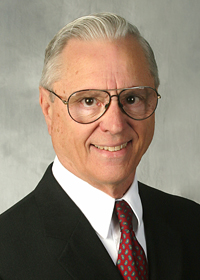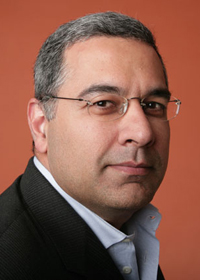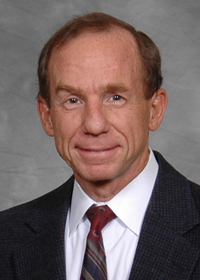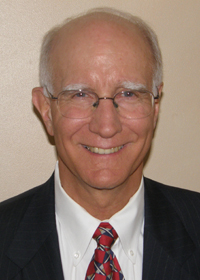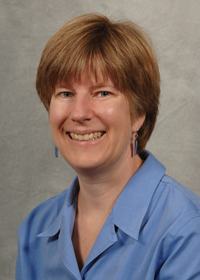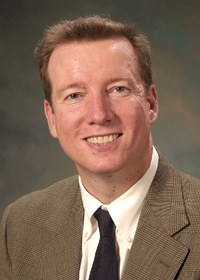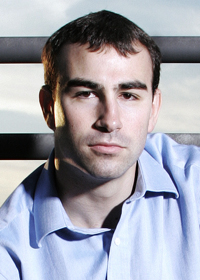It's easy to start your application.
McKelvey Engineering Awards
2008
|
|
Paul L. Chandeysson Paul Chandeysson was the first person with degrees in engineering and medicine to be employed by the Bureau of Medical Devices. In his role at the Bureau, Paul helped expedite the approval of several life-saving devices including the implantable defibrillator and the automatic external defibrillator, which are used on airplanes and in public buildings. |
Following graduation from Washington University, Paul served in the U.S. Army. During his service, he led a research team to develop defenses against enemy electronic counter-measures. Later, Paul earned a Master's Degree in Nuclear Engineering from Stanford University, where he was the recipient of an Atomic Energy Commission Fellowship.
Within private industry, Paul held several engineering positions including work on the Moon Landing Program, for which he received the NASA Apollo Program Achievement Award. His other projects included the unmanned Surveyor moon lander, the Mariner spacecraft to Mars and the first efforts of the United States to study Venus.
Paul returned to school and graduated with distinction in 1976, at the age of 40, from George Washington University Medical School. Paul practiced medicine as a Nuclear Medicine Physician at several hospitals and later became chairman of the Department of Nuclear Medicine at the Washington Hospital Center.
Paul has provided his leadership to Washington University through his work as the co-chairman of the Class of 1958 50th Reunion Gift Committee, a Life Member of the Eliot Society, and a sponsor of the Chandeysson Electric Endowed Scholarship in Electrical Engineering. For seven years, Paul has also served as a member of the Washington University Regional Cabinet of Washington, D.C.
Paul and his wife, Ruth, met as freshmen at Washington University. Ruth says, "Paul and I met in Room 205 of Cupples II. Paul was the only boy who held the door open for me after class. I knew at that time that he was someone special."
|
|
Sunil G. Hirani Sunil Hirani is the Chief Executive Officer and Co-Founder of Creditex, a global market leader and innovator in the execution and processing of credit derivatives. Used by more than 1000 traders at the world's top financial institutions, Creditex is the first and leading e-trading platform in credit derivatives. In 2007, the platform executed over $3 trillion in credit default swap (CDS) indices, single-name CDS and standardized structured credit products. In 2007, Creditex was named on Deloitte's New York Technology Fast 50 List. Deloitte reported that the Company witnessed a revenue growth of 779% from 2001 to 2005. |
Before he founded Creditex in 1999, Sunil worked at Deutsche Bank and Bankers Trust where he was involved with numerous aspects of the OTC derivatives business. He also designed, developed, and implemented software and hardware systems for NASA in Houston, Texas.
Crain's New York Business named Sunil to the "40 Under 40" list in 2006. One year later, he was also named a recipient of the Ernst and Young Entrepreneur of The Year Award for financial services.
Sunil is a member of the School of Engineering's National Council and Eliot Society. As an Eliot Fellow, he and his wife, Blanca, established an engineering scholarship fund to be awarded to students with the greatest need.
|
|
Donald A. Jubel Donald Jubel was first introduced to the family business started by his father, Spartan Light Metal Products, while riding in an 18-wheeler truck. It was March of 1961 and the truck was delivering the first pieces of equipment to the new company. Spartan Light Metal Products provides highly engineered aluminum and magnesium die cast solutions for the power train markets and has the distinct recognition of exporting a critical engine part to a Lexus engine plant in Japan. |
During college summer breaks, Don worked at Spartan in every area of the plant to learn the business from the ground up. In 1978, Don became the initial project engineer for Spartan's magnesium operation. He was responsible for the installation and start-up of 5 new die casting machines and 10 new magnesium products, and the training of new personnel. Spartan currently employs approximately 900 people with operations in Sparta, Illinois; Mexico, Missouri; Hannibal, Missouri; St. Louis, Missouri; Detroit, Michigan; and Tokyo, Japan. After working in several positions in operations, engineering, and sales Don became president on January 1, 1991 and later added the title of Chief Executive Officer in 1999.
Don is past president and current member of the School of Engineering's Alumni Advisory Council and a member of the School's National Council. Don received a Bachelor's Degree in Mechanical Engineering from Washington University in 1973 and a Master of Business Administration from the University of Missouri in 1974.
Beyond his service to Washington University, Don serves as a member of the International Magnesium Association Board of Directors, the St. Louis Metro Advisory Board of Commerce Bank, and the John Burroughs High School Finance Committee. He is a trustee at Whitfield School, a director at Lutheran Elementary School Association, and serves on the Eagle Scout Board of Review. Don is also is a past Chairman of the Board of Elders and currently teaches a third grade Sunday school class at his church.
Don and his wife, Karen, have three children: Melissa, Lindsey, and Lance.
|
|
Charles E. Simmons Charles E. Simmons retired in 2000 from Network Appliance Inc., where he worked as vice president of marketing and vice president of corporate development. At Network Appliance, Inc. he was responsible for strategic planning, mergers and acquisitions, and corporate partnerships during a period that saw the company grow from $50M to $600M in annual revenue. |
Prior to his service at Network Appliance Inc., Charlie managed several marketing functions including business strategy, technology marketing, U.S. field marketing, federal marketing, and program management for Sun Microsystems, Inc. Charlie also worked as a manager for Spectra-Physics, a manufacturer of microwave systems for defense, and a design engineer for Watkins Johnson, a manufacturer of microwave systems for defense.
After graduation from Washington University in 1970, Charlie served in the Coast Guard for three years. In 1973, he furthered his education and pursued a Master's degree in Electrical Engineering at Massachusetts Institute of Technology. In 1975, Charlie moved to California to work at Watkins Johnson and earn an M.B.A. through evening courses at Santa Clara University.
As an Engineering undergraduate, Charlie was in the inaugural class of Langsdorf Scholars and now sponsors current students though as an endowed scholarship sponsor. He is serves on the School of Engineering National Council and is a life member of the Eliot Society.
|
|
Ellen W. Zegura Ellen Zegura oversees the research and graduate programs for the School of Computer Science at Georgia Tech. She is the first chair of this newly organized School and previously served as Interim Dean of the College. |
Ellen's research interests center on computer networks and the Internet, and she is very highly regarded within the networking research community. As a professor, Ellen's research work concerns the development of wide-area (Internet) networking services and, more recently, mobile wireless networking. Her focus is on services implemented both at the network layer, as part of network infrastructure, and at the application layer.
She now chairs the Science Council for the National Science Foundation's GENI (Global Environment for Network Innovation) Initiative. This initiative is a major National Science Foundation program and is expected to lead to the creation of a national network research test bed to address the limitations of the current Internet.
A devoted alumna of Washington University, Ellen serves on the Department of Computer Science and Engineering Advisory Board and is a member of the Eliot Society. As a student, Ellen was a Langsdorf Scholar and Olin Fellow.
Ellen is the proud mom of two girls, Carmen and Bethany.
|
|
Michael K. Gibbons As Program Manager for the Boeing EA-18G, Mike Gibbons led a team through a 5-year $1.2 billion development effort to culminate in 2008. The program will replace all existing carrier-based electronic attack aircraft by 2012. |
Mike graduated with a Bachelor of Science degree in Mechanical Engineering at the top of his class from Georgia Tech in 1983. He started his career at McDonnell Aircraft (now the Boeing Company) as a structural analyst working on the F/A-18 Program. In his 25 years with Boeing, Mike has enjoyed working a wide variety of assignments including the F/A-18, F-15, AV-8B, A-12, JSF, and multiple classified programs. Although Mike considers himself a St. Louis native, he has benefitted from several moves around the nation including time spent in Southern Maryland, Los Angeles, Fort Worth, and Seattle.
Mike works closely with Washington University administrators to forge innovative partnerships and develop collaborations between the School of Engineering and The Boeing Company, and he is a member of Engineering's National Council.
Mike has been married since 1993 to his wife, Karen. They have twin boys, Nathan and Trenton.
|
|
Michael Lefenfeld Michael Lefenfeld is President and Chief Executive Officer of SiGNa Chemistry, a company based in New York, New York that he co-founded in late 2003. In conjunction with Dr. James Dye, a former professor at Michigan State University, Michael discovered a way to stabilize alkali metals and their derivatives by combining them with nano-structured metal oxides to yield a stable powder retaining all of the chemical reactivity. Also, when mixed with water, this powder produces cheap, clean hydrogen gas. In short, his discovery has led to the "first advancement in alkali metal chemistry in 100 years" by creating a material useful for manufacturing pharmaceuticals, petroleum refining, and fuel cells. |
Alkali metals readily donate electrons to produce chemical reactions that are highly useful throughout science and industry. Backed by Michael's discoveries, SiGNa Chemistry's core technology has resulted in customers including major corporations such as Pfizer, ExxonMobil, Grace Chemical and Shell Chemical. In SiGNa's lifetime, the company has significantly grown to over 60 employees and revenues reaching above the millions. Michael has self-funded the company.
Recently, Michael signed a deal with Sigma-Aldrich, the world's largest chemical distribution house, to distribute his product to labs and researchers around the country. Sigma-Aldrich was quoted in the New York Times saying, SiGNa's product was the "most valuable material they had added to their catalog this year." Michael has achieved all of this with no sales team and no funding from venture capitalists.
In July 2005, the Forbes Nanotech Report named SiGNa as "the company to watch." Three months later, Business Week Magazine named Michael a top entrepreneur under 25. Nominated by the world's leading technology experts, venture capitalists, technology companies, academia and media, SiGNa Chemistry was also included on The World Economic Forum Technology Pioneers List for 2008.
Michael previously worked as a scientist at Bell Labs and DuPont. He earned a Master's Degree from Columbia University in New York.

